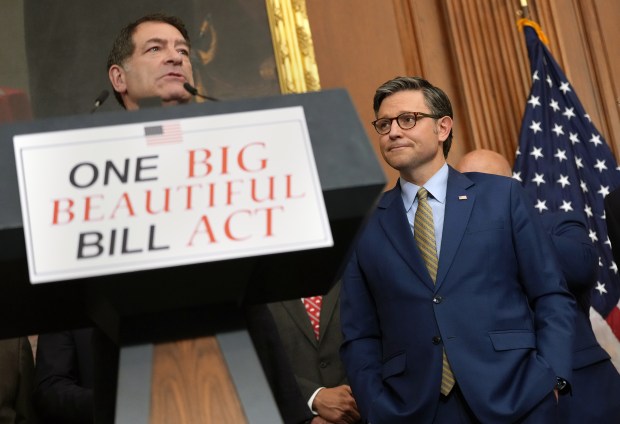On April 22, 1970, college students across the nation gathered on campus quads and on administrative steps. In an explosion of teach-ins, they called attention to the injustices threatening our clean air and water and demanded immediate change. Fervent and radical — and overwhelmingly white — Earth Day was born on college campuses.
Fifty-four years later, we are college students demanding that our institutions take urgent action on climate change. We join more than 5,000 students and 100 campuses from the Sunrise Movement, and Fridays for Future calling on President Joe Biden to declare a climate emergency. We insist that our institutions act with the speed and at the scale that the climate crisis requires because raging fires, floods and droughts are devastating communities already marginalized by systems of oppression. The fossil fuel economy directly contaminates the air and water of Black, brown, Indigenous and low-income communities; it is constructed to benefit wealthy, white members of Western countries.
In 1970, Wisconsin U.S. Sen. Gaylord Nelson declared that the goal of Earth Day was to “involve an entire society in a rethinking of many of its basic assumptions.” More than 12,000 actions — including 1,500 on college campuses — pushed the U.S. government to take environmental issues seriously and ignited a “Green Generation.” Mass mobilization at all institutional levels challenged the assumption that growth equals good, no matter the cost, and demonstrated the power of collective action to effect tangible change. Millions channeled their newfound energy into big policy wins, such as the 1970 Clean Air Act, and victories in the November election and beyond.
Now it’s 2024, and we’re staring down a similar choice come fall. In November, we will again decide our future with our vote. This April, we must again rethink our assumptions, including those about the environmental movement itself.
From its inception, Earth Day has systematically excluded the communities of color that continue to suffer most from blackouts, heat waves and hurricanes as our planet boils. The mainstream environmental movement that grew out of 1970 remained separate from civil rights organizers, focusing on protecting places over people and maintaining a “politically neutral” ecological conservation agenda that ignored the intersection between environmental degradation and racial injustice.
The fight against fossil fuels is a fight against the cycles of injustice that uphold and are sustained by extractive industries, including the military-industrial complex, which is fueling the genocide in Gaza, and prisons and jails — which are in the 90th percentile or more for pollution-related cancer risk and proximity to hazardous waste.
We follow in the footsteps of the first Earth Day, not to repeat it but to reclaim it. We are building a multiracial, cross-class movement to destroy fossil fuel influence in our politics and institutions and center the communities most affected by the climate crisis.
This change starts in our educational institutions. As we saw with Earth Day in 1970, education sparks transformation. Our universities should not claim to responsibly educate the next generation while our classrooms drip with oil influence and our campuses squeeze out surrounding communities. Our schools’ climate and geological science research is funded by fossil fuel industry grants. Universities’ tax-exempt status deprives towns of revenue for climate mitigation and decarbonization incentives. Fossil-fuel foundation gifts pay for campus operations. Big Oil recruiters are welcomed onto campuses to employ students in a dying industry that kills millions of people each year.
Instead of greenwashing, we push for fair partnerships with local environmental justice organizations, municipalities, and K-12 schools, following the examples set by universities nearby.
We demand that our colleges and universities:
-
Divest from fossil fuels and invest in environmental justice initiatives.
-
Dissociate from Big Oil and build relationships with front-line communities.
-
Decarbonize our campuses and lead on real climate solutions.
Universities shape social trends — we’ve seen it from gender and racial equality to divestment from South African apartheid. In 2020, the University of California became the largest university to divest after years of organizing by students, faculty and staff. After years of student activism, in 2021, Harvard divested its endowment from fossil fuels and set a precedent for other powerful institutions. When universities cut ties with the fossil fuel industry and partner with neighbors to improve the air, water and education of our entire community, they become true leaders of change.
In 1970, students channeled the energy generated on Earth Day into wins at the November election. We can do the same. With 41 million Gen Zers eligible to vote this year, Biden must honor the priorities of young people.
This Earth Day, youths across the country and beyond declare a climate emergency and demand climate justice action from the highest powers in our government to our own educational institutions. On behalf of our homes, families and communities, we are scared, and we are furious. We believe we can build a more just and sustainable future. Universities, politicians, friends: Join us.
Trey McCallister is a student at the University of Illinois at Urbana-Champaign and part of the Students for Environmental Concerns. Garrett Brand attends Brown University and is a coordinator for the Sunrise Movement. Amanda Campos attends Stanford University and is a member of the True School of Sustainability. Annika Weber attends Pomona College and is part of Claremont Colleges Environmental Justice.
Submit a letter, of no more than 400 words, to the editor here or email letters@chicagotribune.com.




